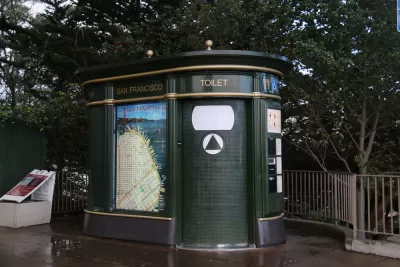San Francisco’s Pit Stop program, which provides public restroom facilities to vulnerable and unhoused residents, has helped contribute to a decline in feces-related service calls in the Tenderloin.

Adriana Rezel reports in a paywalled article for the San Francisco Chronicle: “Since 2012, San Francisco’s 311 hotline, which allows people to make requests of city service representatives, has received more than 230,000 complaints about human or animal waste in the streets. Over that period, the number of these calls has been steadily increasing in every San Francisco neighborhood, with one exception.”
That exception might surprise—it’s the Tenderloin, the neighborhood in the city most commonly associated with people experiencing homelessness and mental illness.
According to the Chronicle’s analysis, “the average neighborhood saw a nearly 400% increase in calls from 2012 to 2021, the Tenderloin actually saw a 29% decrease.” The city’s most recent Homeless Point-In-Time Count, released in August, estimated that 20,000 people will experience homelessness in the city this year—only a slight drop from 2019, and not commensurate in the decline in feces-related 311 calls in the Tenderloin. Moreover, 311 calls increased by 95 percent over the same period, according to Rezel.
So what reason could there be for the decline? “The most likely explanation is the introduction of the San Francisco Public Works department’s Pit Stop Program,” writes Rezel.
“Started in 2014, the Pit Stop Program is an initiative that offers free-to-use public toilets in select locations. With 33 locations now open in 13 neighborhoods across the city, Pit Stops are attended by paid staff during working hours and offer running water, soap and other services such as dog waste bags and boxes for needle disposal,” according to the article.
FULL STORY: Poop complaints have swelled in all San Francisco neighborhoods — except this one

Montreal Mall to Become 6,000 Housing Units
Place Versailles will be transformed into a mixed-use complex over the next 25 years.

Planetizen Federal Action Tracker
A weekly monitor of how Trump’s orders and actions are impacting planners and planning in America.

DARTSpace Platform Streamlines Dallas TOD Application Process
The Dallas transit agency hopes a shorter permitting timeline will boost transit-oriented development around rail stations.

Interactive Map Reveals America's “Shade Deserts”
Launched by UCLA and American Forests to combat heat-related deaths, the tool maps the shade infrastructure for over 360 U.S. cities.

Bicycles and Books — In Sacramento, Libraries Now Offer Both
Adult library card holders can check out e-bikes and e-trikes for up to one week.

Colorado Landfills Emit as Much Pollution as 1M Cars
Landfills are the third-largest source of methane pollution in Colorado, after agriculture and fossil fuel extraction.
Urban Design for Planners 1: Software Tools
This six-course series explores essential urban design concepts using open source software and equips planners with the tools they need to participate fully in the urban design process.
Planning for Universal Design
Learn the tools for implementing Universal Design in planning regulations.
City of Mt Shasta
City of Camden Redevelopment Agency
City of Astoria
Transportation Research & Education Center (TREC) at Portland State University
City of Camden Redevelopment Agency
Municipality of Princeton (NJ)
Regional Transportation Commission of Southern Nevada





























